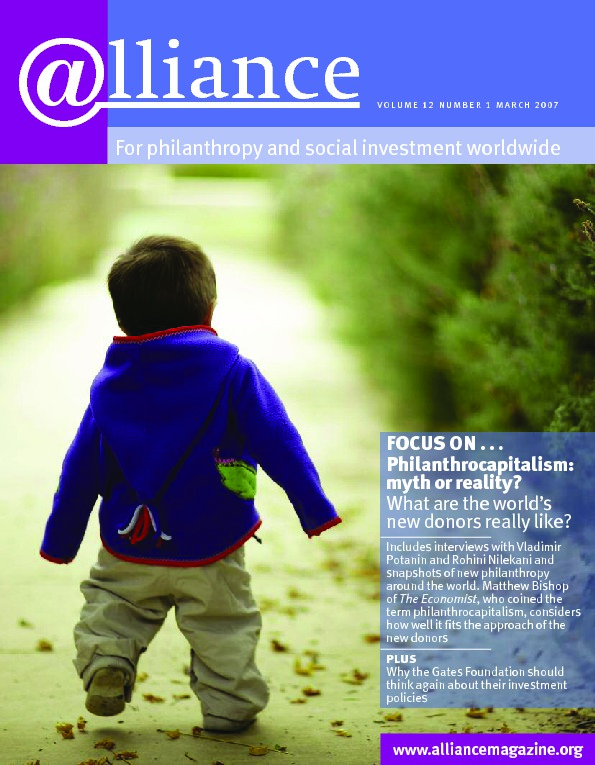When talking about ‘philanthrocapitalism’, it’s important to keep in mind that new trends in philanthropy reflect the socio-economic evolution of society. In the new economy, ideas and creativity capitalize much faster than industrial assets, and human relationships therefore become a more effective tool in corporate practices than financial indicators and operational efficiency. The new philanthropy tries to follow these trends, practising a relationship-based approach to giving.
It’s not fair to say that ‘traditional’ grantmaking foundations are not results-oriented or do not take a hands-on approach, but they still tend to use the size of their endowment and the value of grants distributed as the measure of success, while the new philanthropy focuses on building successful and self-reliant organizations.
However, it’s important to stress that all the new economic trends in Western societies build on an established market, democratic institutions, and sane regulatory environments. Equally, the new philanthropy is based on long-standing traditions of giving and well-established philanthropic institutions. Russia lacks all these things.
Over the last two decades, Russian capitalism has been developing without existing patterns, proper business education or clear policy from the state. This harsh environment made most Russian entrepreneurs exceptionally self-reliant and inclined to distrust others and believe only in their own judgements.
In their giving, too, the first Russian capitalists had no precedent to go on. The non-profit sector that emerged, funded mainly from abroad, could not offer adequate service or articulate its mission and value to society. The infrastructure of philanthropic foundations, charities and intermediaries is still in embryonic form, and the very few private foundations that exist spend money at the whim of their founders or the behest of the authorities, while human rights and social justice issues are avoided. Boards are not considered useful.
So the challenge is this: can the wild capitalism (which has recently turned into an equally wild state capitalism) be transformed into a civilized, socially oriented market economy? And can wild Russian philanthrocapitalism grow into a philanthropic sector with an established infrastructure, aimed at innovations in the social sector?
Very slowly, the process is moving forward. As the rules governing economic relationships become clearer, businessmen are becoming more aware of where they live and what their place is in this country. More philanthropic institutions are being created, more prominent people are getting involved in philanthropy, and more thought is being given to the place of the third sector. The law on endowments was adopted at the beginning of 2007, and although it gives no tax incentives to donors, it provides a crucial basis for civilized philanthropy.
The clearest example of a professional and strategic approach to philanthropy is the Vladimir Potanin Foundation, the first Russian private foundation. It began eight years ago with scholarship programmes and has now begun to concentrate on evaluating the impact that it has had on the Russian educational system. Mr Potanin has put time and thought into ways of improving the environment for philanthropy and used his influence to lobby for the law on endowments.
A striking example of an entrepreneurial philanthropic initiative is the Vnimanie (‘The Attention’) Foundation, recently incubated by CAF Russia. Up to now, Attention Deficit Hyperactivity Disorder (ADHD) has not been considered as a disorder requiring treatment in Russia, but a businessman with a long-standing interest in the issue has succeeded, through his foundation, in bringing ADHD to the attention of the highest level of Russian healthcare authorities and is beginning to change federal policies with regard to its treatment.
Other successful businessmen are beginning to establish private foundations, too: Oleg Deripaska and the Volnoe Delo Foundation, which aims to revive his homeland community, is one, while Dmitry Zimin and the Dynasty Foundation, which supports young scientists to help keep them in Russia, is another.
These are small but significant steps in transforming the philanthrocapitalism of rich individuals into a philanthropy sector, where the value of the non-profit organization is recognized and supported.
Vadim Samorodov is Programme Director at Charities Aid Foundation (CAF) Russia. Email vsamorodov@cafrussia.ru






Comments (0)